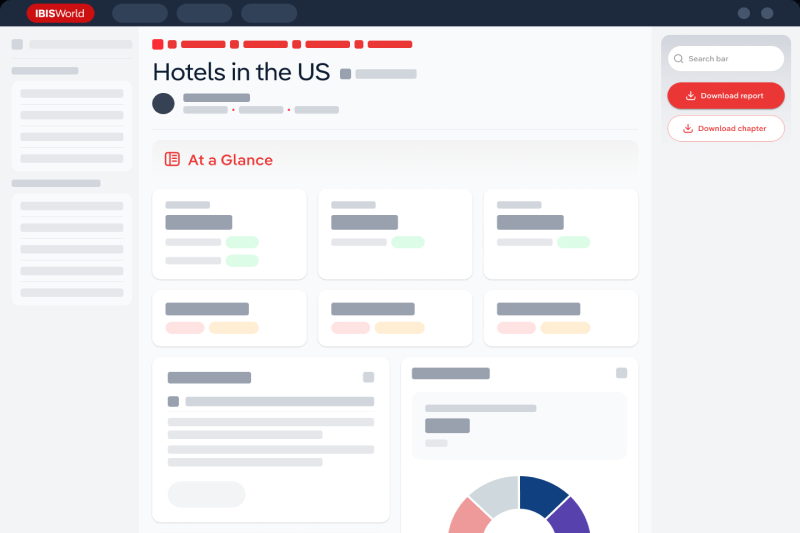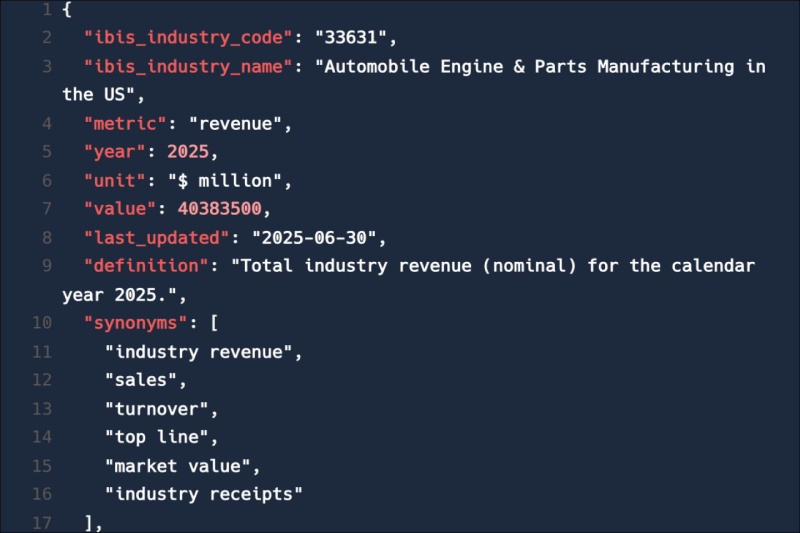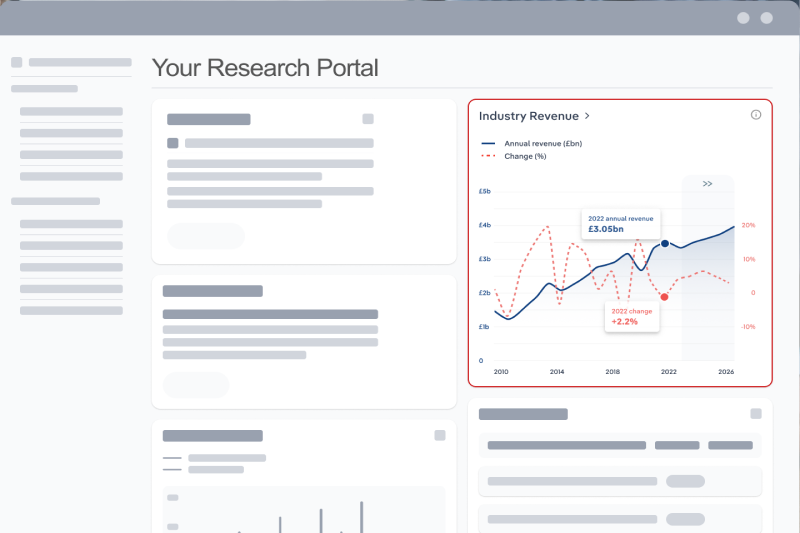IBISWorld Platform
Answer any industry question in minutes with our entire database at your fingertips.

Lime and plaster manufacturers are heavily reliant on strong performance in downstream construction and industrial markets, with revenue typically following economic cycles. Supportive government policies like the Affordable Homes Programme and infrastructure frameworks like the Road Investment Strategy 2 have aided revenue prospects amid slumping private construction output. Private residential construction output has been dampened by low private investor sentiment amid elevated borrowing costs, placing a reliance on public sector funding. This has helped bolster sales of lime and plaster, with revenue in the five years through 2025-26 anticipated to climb at a compound annual rate of 5.1% as a result.

Answer any industry question in minutes with our entire database at your fingertips.

Feed trusted, human-driven industry intelligence straight into your platform.

Streamline your workflow with IBISWorld’s intelligence built into your toolkit.
IBISWorld's research coverage on the Lime & Plaster Manufacturing industry in the United Kingdom includes market sizing, forecasting, data and analysis from 2016-2031. The most recent publication was released January 2026.
The Lime & Plaster Manufacturing industry in the United Kingdom operates under the SIC industry code C23.520. Companies in this industry manufacture lime products like quicklime, slaked lime and hydraulic lime, as well as calcined dolomite and plaster using natural and synthetic gypsum. These lime and plaster products play a crucial role in key downstream markets, including manufacturing, construction, agriculture and water and sewerage management. Related terms covered in the Lime & Plaster Manufacturing industry in the United Kingdom include hydrated lime, quicklime, slaked lime, synthetic gypsum and natural gypsum.
Products and services covered in Lime & Plaster Manufacturing industry in the United Kingdom include Quicklime, Slaked lime and Plaster.
Companies covered in the Lime & Plaster Manufacturing industry in the United Kingdom include Singleton Birch Ltd, Saint-Gobain Construction Products UK Ltd and Lhoist UK Ltd.
The Performance chapter covers detailed analysis, datasets, detailed current performance, sources of volatility and an outlook with forecasts for the Lime & Plaster Manufacturing industry in the United Kingdom.
Questions answered in this chapter include what's driving current industry performance, what influences industry volatility, how do successful businesses overcome volatility, what's driving the industry outlook. This analysis is supported with data and statistics on industry revenues, costs, profits, businesses and employees.
The Products and Markets chapter covers detailed product and service segmentation, analysis of major markets and international trade data for the for the Lime & Plaster Manufacturing industry in the United Kingdom.
Questions answered in this chapter include how are the industry's products and services performing, what are innovations in industry products and services, what products or services do successful businesses offer and what's influencing demand from the industry's markets. This includes data and statistics on industry revenues by product and service segmentation and major markets.
The Geographic Breakdown chapter covers detailed analysis and datasets on regional performance of the Lime & Plaster Manufacturing industry in the United Kingdom.
Questions answered in this chapter include where are industry businesses located and how do businesses use location to their advantage. This includes data and statistics on industry revenues by location.
The Competitive Forces chapter covers the concentration, barriers to entry and supplier and buyer profiles in the Lime & Plaster Manufacturing industry in the United Kingdom. This includes data and statistics on industry market share concentration, barriers to entry, substitute products and buyer & supplier power.
Questions answered in this chapter include what impacts the industry's market share concentration, how do successful businesses handle concentration, what challenges do potential industry entrants face, how can potential entrants overcome barriers to entry, what are substitutes for industry services, how do successful businesses compete with substitutes and what power do buyers and suppliers have over the industry and how do successful businesses manage buyer & supplier power.
The Companies chapter covers Key Takeaways, Market Share and Companies in the Lime & Plaster Manufacturing industry in the United Kingdom. This includes data and analysis on companies operating in the industry that hold a market share greater than 5%.
Questions answered in this chapter include what companies have a meaningful market share and how each company is performing.
The External Environment chapter covers Key Takeaways, External Drivers, Regulation & Policy and Assistance in the Lime & Plaster Manufacturing industry in the United Kingdom. This includes data and statistics on factors impacting industry revenue such as economic indicators, regulation, policy and assistance programs.
Questions answered in this chapter include what demographic and macroeconomic factors impact the industry, what regulations impact the industry, what assistance is available to this industry.
The Financial Benchmarks chapter covers Key Takeaways, Cost Structure, Financial Ratios, Valuation Multiples and Key Ratios in the Lime & Plaster Manufacturing industry in the United Kingdom. This includes financial data and statistics on industry performance including key cost inputs, profitability, key financial ratios and enterprise value multiples.
Questions answered in this chapter include what trends impact industry costs and how financial ratios have changed overtime.
The Industry Data chapter includes 10 years of historical data with 5 years of forecast data covering statistics like revenue, industry value add, establishments, enterprises, employment and wages in the Lime & Plaster Manufacturing industry in the United Kingdom.
More than 6,000 businesses use IBISWorld to shape local and global economies
We were able to supplement our reports with IBISWorld’s information from both a qualitative and quantitative standpoint. All of our reporting now features some level of IBISWorld integration.

IBISWorld delivers the crisp business knowledge we need to drive our business. Whether it be serving up our major clients, winning new business or educating on industry issues, IBISWorld brings real value.

IBISWorld has revolutionised business information — which has proved commercially invaluable to exporters, investors and public policy professionals in Australia and overseas.

When you’re able to speak to clients and be knowledgeable about what they do and the state that they operate in, they’re going to trust you a lot more.

The market size of the Lime & Plaster Manufacturing industry in the United Kingdom is £351.0m in 2026.
There are 20 businesses in the Lime & Plaster Manufacturing industry in the United Kingdom, which has grown at a CAGR of 2.1 % between 2021 and 2026.
The Lime & Plaster Manufacturing industry in the United Kingdom is likely to be impacted by import tariffs with imports accounting for a moderate share of industry revenue.
The Lime & Plaster Manufacturing industry in the United Kingdom is likely to be impacted by export tariffs with exports accounting for a moderate share of industry revenue.
The market size of the Lime & Plaster Manufacturing industry in the United Kingdom has been growing at a CAGR of 5.1 % between 2021 and 2026.
Over the next five years, the Lime & Plaster Manufacturing industry in the United Kingdom is expected to grow.
The biggest companies operating in the Lime & Plaster Manufacturing industry in the United Kingdom are Singleton Birch Ltd, Saint-Gobain Construction Products UK Ltd and Lhoist UK Ltd
Quicklime and Slaked lime are part of the Lime & Plaster Manufacturing industry in the United Kingdom.
The company holding the most market share in the Lime & Plaster Manufacturing industry in the United Kingdom is Singleton Birch Ltd.
The level of competition is high and increasing in the Lime & Plaster Manufacturing industry in the United Kingdom.




